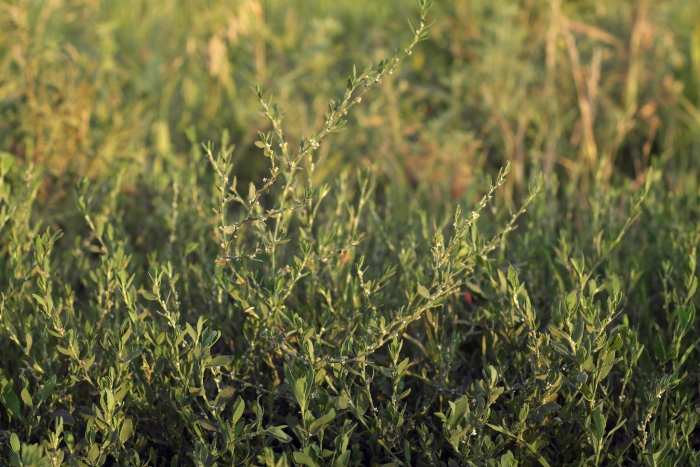Common Knotgrass
(Polygonum aviculare)
Common Knotgrass (Polygonum aviculare)
/
/

Vasily Moryashkin
CC BY 4.0
Image By:
Vasily Moryashkin
Recorded By:
Copyright:
CC BY 4.0
Copyright Notice:
Photo by: Vasily Moryashkin | License Type: CC BY 4.0 | License URL: http://creativecommons.org/licenses/by/4.0/ | Rights Holder: Vasily Moryashkin | Publisher: iNaturalist | Date Created: 2023-07-28T20:00:27-07:00 |






Estimated Native Range
Summary
Polygonum aviculare, commonly known as common knotgrass, is an annual herb that originates from a wide range of habitats including roadsides, fields, and waste places in Eurasia. It has since naturalized in temperate regions worldwide. This plant typically grows 4-16 inches high and features semi-erect stems, hairless leaves, and small, inconspicuous white or pink flowers that bloom from June to October. The flowers are not particularly showy, but they do produce a prolific number of seeds.
Common knotgrass is known for its resilience and ability to thrive in compacted soils, which makes it a frequent colonizer of disturbed sites. It is often considered a weed in agricultural and garden settings due to its invasive nature and rapid growth. In cultivation, it prefers full sun to part shade and can tolerate a wide range of soil types with varying drainage. While it is not typically grown for ornamental purposes, it has been used in traditional medicine and can serve as a ground cover in areas where other plants might struggle to survive. Gardeners should be cautious, as it can become invasive outside its native range, and its hardiness allows it to outcompete other plants.CC BY-SA 4.0
Common knotgrass is known for its resilience and ability to thrive in compacted soils, which makes it a frequent colonizer of disturbed sites. It is often considered a weed in agricultural and garden settings due to its invasive nature and rapid growth. In cultivation, it prefers full sun to part shade and can tolerate a wide range of soil types with varying drainage. While it is not typically grown for ornamental purposes, it has been used in traditional medicine and can serve as a ground cover in areas where other plants might struggle to survive. Gardeners should be cautious, as it can become invasive outside its native range, and its hardiness allows it to outcompete other plants.CC BY-SA 4.0
Plant Description
- Plant Type: Herb
- Height: 0.25-0.6 feet
- Width: 2-3 feet
- Growth Rate: Moderate, Rapid
- Flower Color: Pink, White
- Flowering Season: Spring, Summer, Fall
- Leaf Retention: Deciduous
Growth Requirements
- Sun: Full Sun
- Water: Medium
- Drainage: Medium, Fast
Common Uses
Erosion Control, Low Maintenance
Natural Habitat
Wide range of habitats including roadsides, fields, and waste places in Eurasia
Other Names
Common Names: Common Knotgrass, Pigweed, English Knotgrass, Knotgrass, Knotweed, Prostrate Knotweed, Wireweed, Birdweed, Lowgrass
Scientific Names: , Polygonum aviculare, Centinodium aviculare, Polygonum arenarium, Polygonum aviculare subsp. vegetum, Polygonum aviculare var. aviculare, Polygonum aviculare var. crassifolium, Polygonum aviculare var. erectum, Polygonum aviculare var. eximium, Polygonum aviculare var. rurivgum
GBIF Accepted Name: